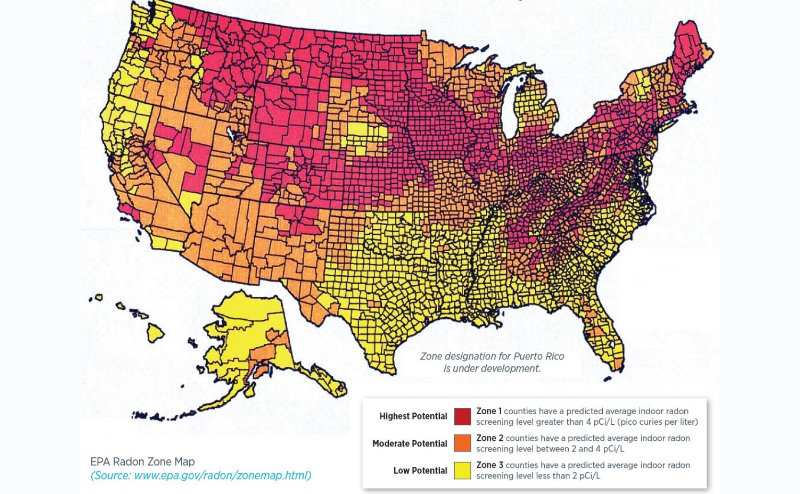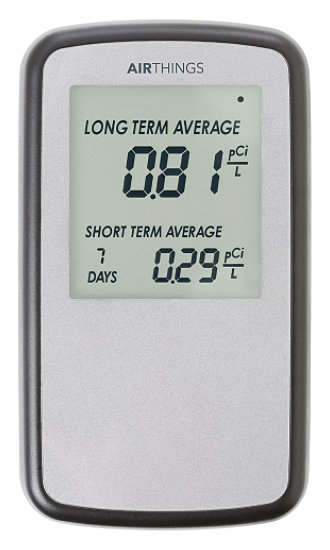

Radon is a real serious potential problem for your health. It is invisible. Odorless. Radioactive. It can cause lung cancer. Common questions about it include, “How do I know if there’s radon in my home?” “What radon levels are considered bad?” “What’s the best air filter for radon gas?” “When should I hire a professional?”
Does an air filter even work for radon? My research says yes, to an extent. However an air filter for radon should not be your permanent fix to reduce or eliminate radon gas in your home.
What kind of air filter works to remove radon from the environment?
The best air filter / purifier for radon in your home must have an activated carbon filter. It’s the only kind of air filter that can catch radon gas.
Important – Air filters aren’t as good as “radon reduction systems”. If you have a serious problem with radon, consult a radon specialist.
How do you know if there is radon in the house?
First, know your risk. Look at a map of the United States which shows color-coded Risk Zones 1, 2, and 3 (the highest risk for radon). You can also view greater resolution radon maps of individual states, sourced from EPA.gov
The only conclusive way to know if there’s radon in your home is to test the air. There are a number of ways to do this. You can hire a professional. Or you can buy a test kit which you send to a lab afterwards. And now there is a home radon detector that you can leave on all the time (developed in Norway by a spin off of CERN of Geneva, Switzerland).
But wait a minute… What is Radon Gas and Why should I be concerned?
According to EPA estimates, radon is the number one cause of lung cancer among non-smokers. Overall, radon is the second leading cause of lung cancer. Radon is responsible for about 21,000 lung cancer deaths every year. About 2,900 of these deaths occur among people who have never smoked.
Radon comes from the natural (radioactive) breakdown of uranium in soil, rock and water and gets into the air you breathe. Radon can be found all over the U.S. It can get into any type of building—homes, offices, and schools—and result in a high indoor radon level. But you and your family are most likely to get your greatest exposure at home, where you spend most of your time.
Nearly 1 out of every 15 homes in the U.S. is estimated to have elevated radon levels.
What Radon Levels Are Bad?
The EPA recommends that you should consider fixing if radon levels are between 2 and 4 pCi/L. However your really must fix if levels are above 4 pCi/L.
They also say that reducing radon levels below 2 pCi/L is difficult.
The average indoor radon level is 1.3 pCi/L.
The average outdoor radon level is 0.4 pCi/L.
Radon Detector for your home
Traditionally, consumers only had two options: call a professional to test their radon levels, or purchase a single-use charcoal test which was then sent to a lab for the results.
However I’ve discovered a radon detector product line from a company with scientists working together at CERN (European Organization for Nuclear Research). Their mission, “to offer accurate, user-friendly radon detectors to the masses, making them as common as smoke detectors.”
Theirs is my personal choice. Rather than spending money on one-time tests, I prefer the continuous “always on” radon detector from a product I trust. I am comfortable with its design, manufacture, and method of detecting and quantifying radon gas in the home.

>> Corentium Home
(view on amzn)
Air Filter With Activated Carbon For Radon In Your Home
It is the carbon which soaks up the radon. Just be sure your air filter of choice has activated carbon as part of its overall filtration.
There are many very good reasons to run an air filter (or multiple air filters) in your home. I do. Although I do not suffer in a bad way from seasonal allergies, I do notice some troubles during those times.
Have you ever been sitting there with the sun streaming into the room “just right” so you could see all of the dust (and other) particles floating in the air?! It can be insane! Well, no more… An air filter will damper that significantly. The added assurance of some radon prevention is yet another good reason to have one.
If money is no object, among the best air purifiers with additional activated carbon as follows (view on amzn),
>> NuWave OxyPure Large Area Smart Air Purifier
>> RabbitAir Ultra Quiet HEPA Air Purifier
And by far, the most popular “cheap” air purifier (with carbon pre-filter) is…
via Modern Survival Blog at https://ift.tt/2AlX5J9

0 Comments